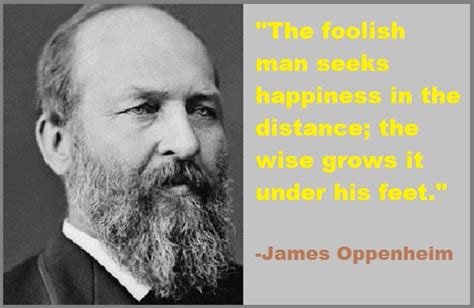A Quote by James Oppenheim
The foolish man seeks happiness in the distance; the wise grows it under his feet.
Related Quotes
No man is so foolish but may give another good counsel sometimes; and no man is so wise, but may easily err, if he will take no others counsel but his own. But very few men are wise by their own counsel; or learned by their own teaching. For he that was only taught by himself had a fool to his master.
But neither life nor happiness can be achieved by the pursuit of irrational whims. Just as man is free to attempt to survive in any random manner, but will perish unless he lives as his nature requires, so he is free to seek his happiness in any mindless fraud, but the torture of frustration is all he will find, unless he seeks the happiness proper to man. The purpose of morality is to teach you, not to suffer and die, but to enjoy yourself and live.





































